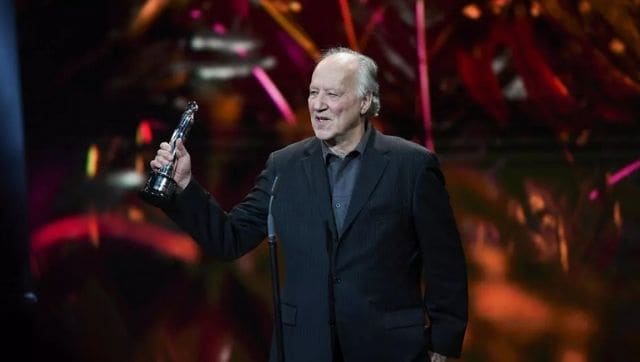Werner Herzog’s Fireball covers the gamut of space rocks from the Black Stone at Mecca to Oumuamua, the first known interstellar object detected passing through the Solar System
Werner Herzog leaves behind a Star Wars role to explore the real cosmos, pointing his lens at falling skies for his latest documentary Fireball, which premiered Thursday at the Toronto film festival.
Teaming up once again with volcanologist Clive Oppenheimer — with whom he previously collaborated on the Academy Award-nominated film Encounters at the End of the World and Into the Inferno — the illustrious filmmaker travels the world in search of meteors in his latest documentary, revealing their deep impacts on our history and mythology.
The film covers the gamut of space rocks from the Black Stone at Mecca to Oumuamua, the first known interstellar object detected passing through the Solar System.
The pair explore notions that life on Earth was seeded by meteors rich in amino acids and other key compounds, and recount apocalyptic impacts of the past, raising questions about humanity’s preparedness for the next big strike.
“It’s an absolutely fascinating topic which touches on our origins, our destiny, our beliefs, why do we think Heaven is up there, what does it mean when we see a comet or shooting star,” Oppenheimer said in an interview from his home in Cambridge, England.
“So, there was a phenomenally rich domain for us to dig into, and from different angles: philosophical, metaphysical, cultural, and scientific,” he said.
“It’s this sense of the night sky, of the nocturnal, that awe of the cosmos is what we were chasing.”
From Los Angeles, Herzog told AFP their investigation led him to conclude alien life is likely — “some (meteors) carry sugar, a building block of life, so the probability is good that there’s something out there” — while fears of a deadly strike were overstated.
“Maybe in two million years we’ll be hit by something big… let’s face it, so what?” he added, citing threats of nuclear war, a huge volcanic eruption, or “some really mean microbes.”
Oppenheimer agrees that there are far greater existential threats.
But after visiting observatories in Hawaii searching the skies for near-Earth objects and NASA’s planetary defense coordination office for the film, he commented: “I’m glad that there are people with telescopes looking up at the night sky tracking these things and people modelling scenarios for what would happen, how you might deflect it.”
Herzog appeared in the first season of the Star Wars series The Mandalorian on Disney Plus last year, but (spoiler alert) his villainous character dies and “won’t be revived,” he told AFP.
“Let’s say I am not defined by some work that I did on four shooting days (for Star Wars). I have 50 years of filmmaking behind me,” he said dryly, then added with a grin: “I’m good on screen when I’m playing the real bad guy, the badass bad guy.”
Throughout Fireball, stray dogs make cameos. Audiences learn that meteorites “smell like old socks or mothballs,” and that dogs can be trained to sniff them out, but their casting was for an altogether different reason.
Herzog said he just felt bad for them, “they were so sad, so worn out.” “And I always like animals in my movies.”
Due to the pandemic, this might be the last documentary film from these two for some time. Both admitted to having spent most of the past months writing at home, under lockdowns.
“It would be irresponsible to venture out with a camera” during the Covid-19 outbreak, Herzog said. Instead, he’s been writing poetry and prose.
Fireball will be released on Apple TV+ on 13 November.
Find latest and upcoming tech gadgets online on Tech2 Gadgets. Get technology news, gadgets reviews & ratings. Popular gadgets including laptop, tablet and mobile specifications, features, prices, comparison.

